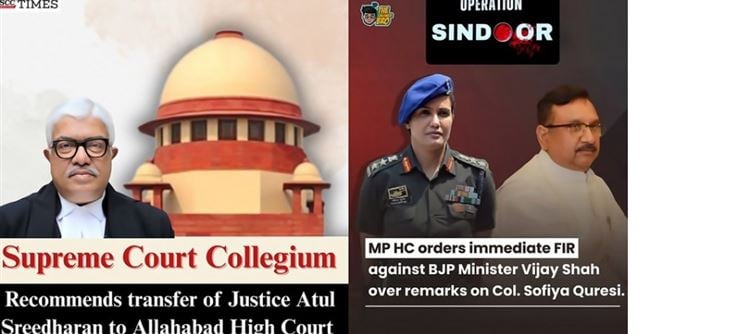
Justice Atul Sreedharan dared to challenge a political titan — a bjp ally accused of anti-Muslim remarks.
The price? Exile from the judiciary.
While the Collegium, fresh from awarding the CJI’s nephew a bench seat, silently complied, the judiciary’s moral compass fractured.
This isn’t a scandal — it’s a declaration of cowardice.
The army brass, the CDS, and even the highest courts remain silent, while democracy gasps under the weight of fear.
What does it mean when the defenders of the Constitution bow to politicians?
It means India’s last bastion of fairness has turned into a theatre of submission.
1. Exile for Courage, Reward for Compliance
Justice Sreedharan’s “crime” was simple: he applied the law against a political heavyweight.
Result? Exile instead of endorsement, punishment instead of protection.
Meanwhile, loyalty to power is celebrated — nepotism is rewarded with bench seats.
This isn’t justice — it’s a perverse performance of power.
2. The Collegium’s Complicity
The very body meant to protect judicial independence has become a gatekeeper of favoritism.
By endorsing political and familial interests over merit and principle, the Collegium demonstrates:
If you are fearless, you are disposable. If you are compliant, you are promoted.
3. The Army’s Silence is Deafening
Even India’s top brass — entrusted with defending the nation’s honour — appears paralyzed.
If the judiciary bends, and the army bows, who is left to uphold the Constitution?
A nation watches as its guardians cower in the face of political intimidation.
4. CJIs and the tradition of Letting indians Down
One Chief Justice after another has failed the people.
Instead of shielding principled judges, they preserve power hierarchies, transforming independence into optional theatre.
The question is no longer “Why is the judiciary under fire?” — it is “Does it even exist anymore?”
5. The Hidden Face of Justice
We were fed illusions: the judiciary is fearless, incorruptible, independent.
The reality: fear, compromise, and political collusion dictate outcomes.
Justice is no longer about law or morality — it is about survival, silence, and strategic obedience.
6. Democracy’s Last Nail
When fair judges are punished and compliant ones rewarded, democracy dies quietly.
India isn’t witnessing judicial missteps — it is watching the collapse of an institution meant to be inviolable.
Without fearless judges, laws become suggestions, rights become privileges, and citizens become powerless.
7. The Moral Crisis
It’s not just a legal issue — it’s a societal emergency.
The judiciary’s failure sends a message: Do not challenge the politically powerful.
If those sworn to uphold justice cannot defend their own, how can they defend the people?
💥 CONCLUSION — THE FINAL STRIKE
Justice Atul Sreedharan’s exile is more than a personal tragedy — it’s a national warning.
The judiciary has become a mirror of submission, the army a shadow of silence, and democracy a casualty of fear.
When power dictates fairness and principle is punished, the Constitution becomes a relic, not a safeguard.
India’s citizens must ask themselves: if even the judiciary is paralyzed, who will defend our rights?




 click and follow Indiaherald WhatsApp channel
click and follow Indiaherald WhatsApp channel